On August 20, there was a passing sprinkle. Not enough to register in the gauge, or to help at all, but enough to embolden the first mountain chorus frog to move from its leaf to the container edge.
Then it did a move worthy of Cary Grant in North by Northwest.
'
And just as desperate (Grant played an innocent man mistaken for a spy and relentlessly pursued by the FBI).
When the droplets dried up, I couldn't find the froglet. And I wondered where it had gone. Where could it go? For those of you getting rain this summer, it's probably hard to imagine gardens and forest without a single damp spot in them. Rock-hard soil and everything limp, wilted, parched and fried. That's what's going on here. There is no water, anywhere, in the soil or the leaf litter or in the streambeds. Lakes, rivers and ponds, yes, there's still water there, but how is a frog the size of my pinky fingernail going to get to them from the top of a dry ridge? It is going to dry up and die as soon as it leaves the pool. I know it in my bones. And I know I have to do something about it.
If these things are going to start metamorphosing, I realize that I have to put them somewhere where they will have both a body of water and moist surrounds. I can't give them that on this sunbaked ridge. Once they're out of the pool, and instinct tells them to disperse, it's out of my hands. And, after months of heavy work and lots of expenditure on water, they are dead.
You see, I've messed with everything. And messed it all up. The tadpoles would have died the first time the puddle dried up in May! But I couldn't let that happen. That puddle would have dried up ten times had I not been hauling water to it. So I made my own bed here by carrying tadpoles from May into mid August, when by all rights they should have long since returned to the soil. But I said no. And what I didn't know when I made the commitment was that the rains would stop completely, and there would be no water for them anywhere. Oops. Now what?
The fact that they hadn't metamorphosed in a normal time span (6-8 weeks) tells me that they somehow sensed that to leave the puddle would be to die. Why change into an air-breathing frog if there's still water here, and there's absolutely nowhere else to go? I lie awake at night, considering all the possibilities. Do they need to feel the wide swings in barometric pressure that accompany storm fronts? Do they need rain sluicing into the puddle to assure them that it's safe to leave? I don't know. I just know that their development had been arrested, and nothing was happening for them. And now that I've taken them in, they're changing, and I have to do something to meet them where they are. At the very least, I have to get myself out from under the need to continue caring for them.

The trees are dropping their leaves on August 20. It's so very sad. August, normally a time of wild abundance in insects and birds, is eerily still and silent. August has been canceled. We're going straight to October.
I can't let them keep dispersing into the desert, only to die, after three long months of toil.
They're so perfect; I owe them better.
What a rotten pickle to be in!
The only thing I can think to do is to take them to the beaver pond on Dean's Fork.
The one whose dam had, for years, had been dynamited by a local jerk who didn't even own the land it was on, until he got a nice visit from the wildlife officer. A little bird tipped the officer. Only then did he finally quit destroying the beavers and their habitat, against the express wishes of the landowner. I feel a very strong sense of stewardship over this pond.
I pour the three tadpole tubs slowly through a strainer to catch all the tadpoles.
They look so much bigger and stronger than they did when I brought them in nine days ago.
Lots of strong hind legs on these gray tree frog tadpoles!
I found two dragonfly larvae (which had been feeding on the tadpoles!)--here's one of them
and one tiny froglet in training. I put it in a Tupperware so it wouldn't drown in all the sloshing, because once they crawl out, they have lungs and have to breathe air.
I poured everyone into a joint compound bucket, loaded them in the car, and headed for Dean's Fork.
Curtis, who hates water, came down the steep bank to make sure Ma didn't fall into the pond. I'm not sure he'd have swum out to rescue me had I plunked in.
I cast a last long look at the pond that would finish the work I started in May with these tadpoles. Had I known what keeping them in water would entail over the next three months, I'd have taken them straight to the beaver pond. But I had to learn the hard way, which seems to be the only way I learn.
I've spent the entire day gathering photos and videos, importing them, and writing up this experience, for you of course, but for me, too, so I have a record of it. I want my photos of different tadpoles and young froglets to be out there for people to refer to. I wanted to document the story of trying to keep a tadpole puddle going in an historic drought. I want to remember what it was like so I don't try anything like this again.
Though I can’t manage to post on my blog more than once a month or so, writing up this foray into the frog world feels more like my real work than the stuff I do all day. It’s personal. It couldn’t be done by anyone but me. That’s the difference.
Next time, if it ever rains again and if spring comes to this parched ridge, the first time the puddle dries down, I'll scoop the tadpoles up and take them straight to Dean's Fork.
Sure I will.
Postscript: After I wrote this, it got hot again, so hot I was glad the tadpoles were free in the beaver pond. It was as if the sky was trying to kill everything beneath it here on earth. I thought it couldn't get any drier, but it did. Despair doesn't quite describe how that felt. My friend and conservation hero Nancy Stranahan, also suffering for all her plant and wildlife friends through this horrible drought, read one of my posts about the drought, called me on the phone, and helped me get to that place of giving up. I had to let it go, and tell myself it likely wouldn't rain again until November. Just throw up my hands and say, OK, I'm going to keep watering, but I will not keep hoping it will rain. Weirdly, that helped. Giving up, expecting absolutely nothing, was the only thing that helped.
I will always be grateful for Nancy's intervention. I picked up the pieces of my mind and got back to work.
And then it began to rain again, in a tentative way, on Wednesday, August 28, at 6:23 PM. A great rushing sound came from the north and there was lightning and thunder and a downpour so sweet and so badly needed I nearly wept. But I laughed instead, like a lunatic. I walked around in the rain and lightning, unafraid, smelling the petrichor, until I was soaked. I splashed in tiny puddles. I raised my face to the sky and let it beat down on me. We got 0.4". On August 29 we got 0.6". And then on August 31, we were gifted with 1.2", and the leaves that had been furled came unfurled. The white snakeroot that was limp as Kleenex has burst into bloom. So has the mistflower. It's too late for the trees, most of which have yellowed and dropped their leaves, saving their energy for next spring. The ground is deep in yellow and brown leaves. I don't know which of them will make it through the winter. It looks like most of my spicebush has died, and many dogwoods. But you never know. Maybe they'll come back. There won't be any dogwood flowers next spring, that much I know.
It will take many more such rains to begin to catch up, but I rolled up several hundred feet of hose today, and with the hours I don't have to spend watering every evening, I did a three-day deep clean of my house, which had been like a neatly kept dust museum through the drought. I simply didn't have the energy to clean. It all went into watering and worrying, getting up the next day and doing it all over again.
Thank you for reading after this long hiatus. It's felt good to talk with you again. Even though, in the age of Facebook and Instagram, nobody comments on blogs any more, I appreciate your time, and I know you're out there.



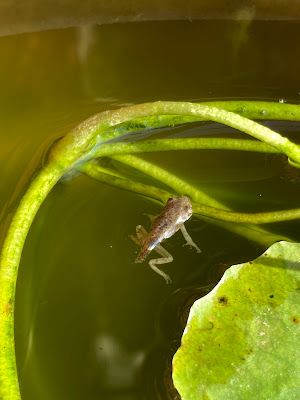








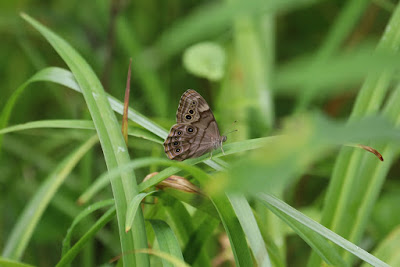









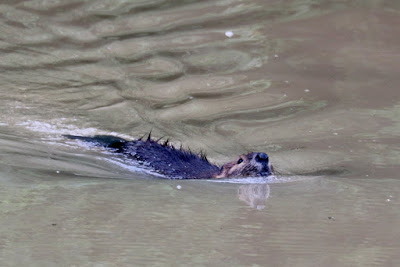








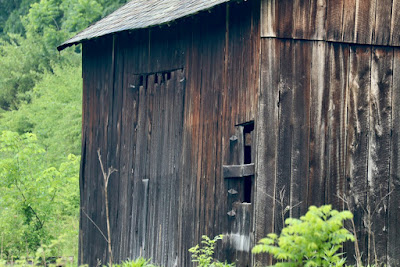
























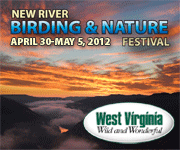
Sunday, September 1, 2024
0 comments